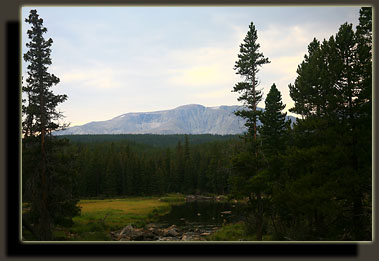 July
30-August 1, 2006 July
30-August 1, 2006
For years I confused
the Cloud Peaks Wilderness in the Bighorn Mts of Wyoming with the Cloud
Peaks in the Never Summer Wilderness in Colorado. It was only until I got
serious about visiting what up until then I assumed was one place that
I discovered the difference. I visited the Cloud Peaks in 2004, and two
years later, I finally blocked out time to visit the Cloud Peak Wilderness
just west of Buffalo Wyoming. Thus it was one bright sunny morning in the
waning days of a hot July in 2006 I cruised north on Interstate 25 with
Frank and Makenzie, our two pointers, in the backseat. The drive to the
Cloud Peak Wilderness from Cheyenne was considerable: close to 5 hours.
I managed to get interested in a book on tape read by an Englishmen who
had the unendingly annoying habit of reading the story barely above a whisper
at a breathtaking clip, then shouting the lines that any character was
actually quoted as saying in a loud drawl. I constantly fiddled with the
volume of the car stereo to get just the right volume. The dogs snoozed
the entire time. Once we hit the winding mountain road west of Buffalo,
however, both dogs stood at attention and waited to be let loose into the
wilds. Makenzie panted incessantly over my shoulder and I reminded myself
to check and see what kind of funk was lodged in her back teeth to maker
her breath reek in this above-average manner. Clouds had blotted out the
former blue shade of the sky, but no moisture came down, so I was content.
We found the Circle Park TH without trouble, full with 17 cars. It was
around 2:45 when I packed my gear and we set off up the trail through the
dense lodgepole pine forest.
The first thing that
caught my attention was the general dryness of the area. I donít know if
this is typical Bighorn July weather, but everything had a tired, faded
look, as if it were really September and almost time for frost. Nothing
bloomed, 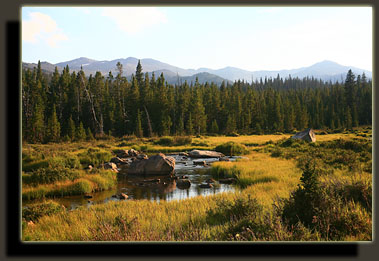 almost
everything wilted or looked yellow, and the soil on the trail puffed up
at each step like flour and hung in the still air like a haze. The trail
lead steadily uphill and was easy to follow. I kept a rhythm involving
my steps and walking stick: 3 steps to 1 walking stick click on flat terrain,
2 to 1 on the uphill stretches. Makenzie trotted up the hill with
ease, apparently oblivious to the 5 pounds of dogfood she carried in her
red sidepacks. Frank trotted along with her, both of them vying for the
pole position on the next interesting smell. I encountered an elderly couple
coming down the trail, and stepped off to let them pass. They were friendly,
and said a few complimentary words about the dogs. Further on, I heard
some loud talking up ahead, so I stopped and waited off the trail. Presently,
5 horsemen came along. I talked to them as they approached so as not to
startle the horses, and the man commented that at least it wasnít hot today.
I agreed, even though sweat was starting to soak through on my chest. Only
someone going downhill, and even better someone on a horse, would make
a comment like that. In less than an hour, we made it to the rocky shore
of the placid Shard Lake. At the trail junction, I noted two backpackers
coming the way of Willow Lake, and nobody coming the way of Trigger Lake.
Since I hadnít made up my mind which direction on this loop I wanted to
take, I chose to the left towards Trigger Lake. We walked along the lakeshore
with the dogs taking keen interest in the water. When Makenzie tried to
lean down to take a drink, her saddlepacks tossed her into the deep water.
She swam to shore and almost
everything wilted or looked yellow, and the soil on the trail puffed up
at each step like flour and hung in the still air like a haze. The trail
lead steadily uphill and was easy to follow. I kept a rhythm involving
my steps and walking stick: 3 steps to 1 walking stick click on flat terrain,
2 to 1 on the uphill stretches. Makenzie trotted up the hill with
ease, apparently oblivious to the 5 pounds of dogfood she carried in her
red sidepacks. Frank trotted along with her, both of them vying for the
pole position on the next interesting smell. I encountered an elderly couple
coming down the trail, and stepped off to let them pass. They were friendly,
and said a few complimentary words about the dogs. Further on, I heard
some loud talking up ahead, so I stopped and waited off the trail. Presently,
5 horsemen came along. I talked to them as they approached so as not to
startle the horses, and the man commented that at least it wasnít hot today.
I agreed, even though sweat was starting to soak through on my chest. Only
someone going downhill, and even better someone on a horse, would make
a comment like that. In less than an hour, we made it to the rocky shore
of the placid Shard Lake. At the trail junction, I noted two backpackers
coming the way of Willow Lake, and nobody coming the way of Trigger Lake.
Since I hadnít made up my mind which direction on this loop I wanted to
take, I chose to the left towards Trigger Lake. We walked along the lakeshore
with the dogs taking keen interest in the water. When Makenzie tried to
lean down to take a drink, her saddlepacks tossed her into the deep water.
She swam to shore and 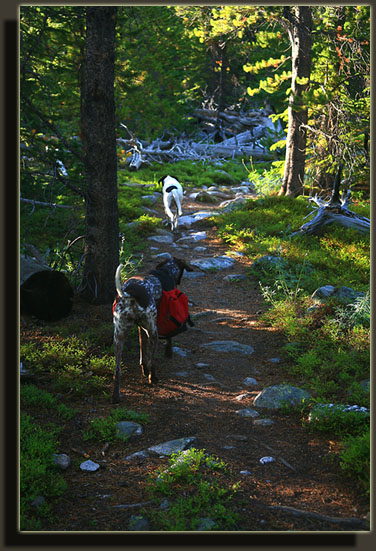 hauled
herself out, dripping. Luckily, I had forseen just this event and had packed
the dogfood in sealed plastic bags. I didnít encounter anyone else for
quite some time, and I began to feel deliciously alone on the trail. It
wound through the splendidly monotonous lodgepole pine forest, generally
heading downhill. I actually began to fret at how much elevation I was
losing on this route, and consulted my map a couple of times to make sure
I was actually going the right way. I began to hit my stride in this stretch,
and the walking was a soothing feeling that I was only dimly aware of as
I got lost in daydreams. The dogs scampered ahead of me, often out of sight.
Occasionally when I began to think it had been a long time since Iíd seen
them, Iíd whistle once and hear theyíd come tearing up the trail. I like
my dogs. I think they like me. At least they do when I have food for them,
of that Iím certain. When Iím scolding them for eating fresh horse shit,
maybe not so much. There was, by the way, a fair amount of horseshit on
the trail. Why is it that dogs love to eat shit so much, anyway? I have
no inclination to try it, letís be clear, but it must have some redeeming
quality that makes it preferable to their other options, including dry
kibbles specially formulated for dogs. It makes one curious, doesnít it?
Does horseshit hide some hidden bouquet of gourmet flavor? Do dogs learn
that deer shit is even better than, say, moose shit? And cat shitÖthat
apparently is so tasty as to be eaten weeks after the event, or even when
frozen. My dogs eat it all (except, interestingly, other dogsí shit), and
I am disgusted. But what can one do? I guess just avoid having them lick
you and try not to think about it. I was awakened from my reverie of daydreams
by a fork in the trail, the one Iíd been watching for on some subconscious
level. I took the right fork, properly, and began to be carried back uphill.
I passed a small lake that was draining through what appeared to be a broken
dam of concrete and steel. As the trail took us higher I began to note
that almost everywhere lay granite boulders. The entire landscape was a
giant rockfield with interspersed patches of lodgepole pine. I reflected
on the effects of glaciation, and that I was far enough north to be in
the territory of the really big glaciers that hung around for a few thousand
years after the last ice age. Their handiwork was impressive. I considered
that I was walking on the remains of a once massive mountain, now broken
and scattered, itís destroyer now vanished. I stopped for a rest and a
snack on the ridge of what I might call a fin of boulders. The clouds still
darkened the sky, but seemed harmless. I imagined Makenzie was tired from
hauling the pack, but when I unbuckled it and let it drop to the ground
her first order of business was to find a suitable rock and present it
to me for a game of fetch, her favorite past time. I ignored her persistence
and digested a granola bar followed by warm water. Further up the trail
I encountered raspberry canes, loaded with mostly unripe fruit. Still,
a few were bright red, and I helped myself to this unexpected delight.
I threw a few unripe berries to Frank and Makenzie who seemed to enjoy
them thoroughly even if they were a bit sour. After all, they had only
horseshit to compare them to so far on this trip and Iíd think they have
got to be better than that. A man and his teenage son passed me going downhill,
and I was a little surprised to see anyone. I had hauled
herself out, dripping. Luckily, I had forseen just this event and had packed
the dogfood in sealed plastic bags. I didnít encounter anyone else for
quite some time, and I began to feel deliciously alone on the trail. It
wound through the splendidly monotonous lodgepole pine forest, generally
heading downhill. I actually began to fret at how much elevation I was
losing on this route, and consulted my map a couple of times to make sure
I was actually going the right way. I began to hit my stride in this stretch,
and the walking was a soothing feeling that I was only dimly aware of as
I got lost in daydreams. The dogs scampered ahead of me, often out of sight.
Occasionally when I began to think it had been a long time since Iíd seen
them, Iíd whistle once and hear theyíd come tearing up the trail. I like
my dogs. I think they like me. At least they do when I have food for them,
of that Iím certain. When Iím scolding them for eating fresh horse shit,
maybe not so much. There was, by the way, a fair amount of horseshit on
the trail. Why is it that dogs love to eat shit so much, anyway? I have
no inclination to try it, letís be clear, but it must have some redeeming
quality that makes it preferable to their other options, including dry
kibbles specially formulated for dogs. It makes one curious, doesnít it?
Does horseshit hide some hidden bouquet of gourmet flavor? Do dogs learn
that deer shit is even better than, say, moose shit? And cat shitÖthat
apparently is so tasty as to be eaten weeks after the event, or even when
frozen. My dogs eat it all (except, interestingly, other dogsí shit), and
I am disgusted. But what can one do? I guess just avoid having them lick
you and try not to think about it. I was awakened from my reverie of daydreams
by a fork in the trail, the one Iíd been watching for on some subconscious
level. I took the right fork, properly, and began to be carried back uphill.
I passed a small lake that was draining through what appeared to be a broken
dam of concrete and steel. As the trail took us higher I began to note
that almost everywhere lay granite boulders. The entire landscape was a
giant rockfield with interspersed patches of lodgepole pine. I reflected
on the effects of glaciation, and that I was far enough north to be in
the territory of the really big glaciers that hung around for a few thousand
years after the last ice age. Their handiwork was impressive. I considered
that I was walking on the remains of a once massive mountain, now broken
and scattered, itís destroyer now vanished. I stopped for a rest and a
snack on the ridge of what I might call a fin of boulders. The clouds still
darkened the sky, but seemed harmless. I imagined Makenzie was tired from
hauling the pack, but when I unbuckled it and let it drop to the ground
her first order of business was to find a suitable rock and present it
to me for a game of fetch, her favorite past time. I ignored her persistence
and digested a granola bar followed by warm water. Further up the trail
I encountered raspberry canes, loaded with mostly unripe fruit. Still,
a few were bright red, and I helped myself to this unexpected delight.
I threw a few unripe berries to Frank and Makenzie who seemed to enjoy
them thoroughly even if they were a bit sour. After all, they had only
horseshit to compare them to so far on this trip and Iíd think they have
got to be better than that. A man and his teenage son passed me going downhill,
and I was a little surprised to see anyone. I had 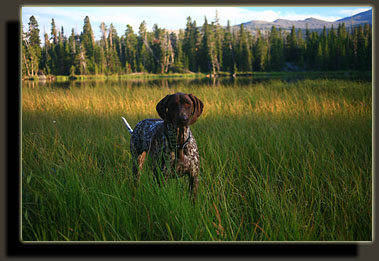 gotten
used to the idea that I was all alone on this trail. A little further on
and I came upon a group of 4 men, all anglers, sprawled in the trail at
the junction with the Trigger Lake spur trail. I said hello to them, they
to me. They asked where I was going and I said vaguely, "I donít know exactly,
just headiní," which probably sounded snobish, but was the truth. I was
a roving man, with no plan. I decided at that instant to go check out Trigger
Lake, so I turned south. The short trail led downhill into a pine-lined
bowl with a small lake at the center. Many dead trees stood about the lake.
I instantly didnít get a good feel for the place, but it was 5:00 and about
time to make camp. I decided to maybe find a place to camp. I followed
the shoreline and then took off uphill on a faint trail. I found a wide
flat spot that had a giant fire ring in it, and then went uphill a little
further into the woods. I set my pack down and pulled Makenzieís pack off
her back. Immediately I was hungry, so I pulled out my stove and cookset
and walked down to a little promontory over the lake and cooked myself
a Ramen noodle delight, followed by a few squares from my Hersheyís bar.
There is almost nothing in this world that compares to the joy of eating
a Hersheyís bar while backpacking. If youíre a backpacker and have never
hauled along a Hersheyís almond bar, you flat out havenít lived yet. I
pulled out my book and the dog food and while Frank ate, more out of jealousy
that Makenzie might eat the food before he did, I read THE STRANGER, by
Albert Camus. I only got through the first few pages when it occurred to
me I ought to set up the tent in case it did decide to rain. I walked
back uphill to the selected spot and pulled my tent free of the straps
that lashed it to my gotten
used to the idea that I was all alone on this trail. A little further on
and I came upon a group of 4 men, all anglers, sprawled in the trail at
the junction with the Trigger Lake spur trail. I said hello to them, they
to me. They asked where I was going and I said vaguely, "I donít know exactly,
just headiní," which probably sounded snobish, but was the truth. I was
a roving man, with no plan. I decided at that instant to go check out Trigger
Lake, so I turned south. The short trail led downhill into a pine-lined
bowl with a small lake at the center. Many dead trees stood about the lake.
I instantly didnít get a good feel for the place, but it was 5:00 and about
time to make camp. I decided to maybe find a place to camp. I followed
the shoreline and then took off uphill on a faint trail. I found a wide
flat spot that had a giant fire ring in it, and then went uphill a little
further into the woods. I set my pack down and pulled Makenzieís pack off
her back. Immediately I was hungry, so I pulled out my stove and cookset
and walked down to a little promontory over the lake and cooked myself
a Ramen noodle delight, followed by a few squares from my Hersheyís bar.
There is almost nothing in this world that compares to the joy of eating
a Hersheyís bar while backpacking. If youíre a backpacker and have never
hauled along a Hersheyís almond bar, you flat out havenít lived yet. I
pulled out my book and the dog food and while Frank ate, more out of jealousy
that Makenzie might eat the food before he did, I read THE STRANGER, by
Albert Camus. I only got through the first few pages when it occurred to
me I ought to set up the tent in case it did decide to rain. I walked
back uphill to the selected spot and pulled my tent free of the straps
that lashed it to my 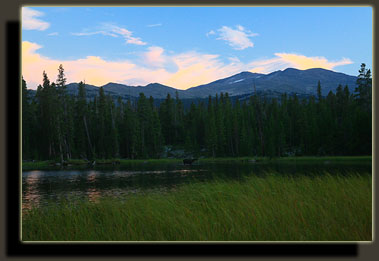 green
frame pack. I stepped over to the area I had decided upon and carefully
guaged the slope and angle for optimum placement. I didnít like what I
saw so I went uphill 10 feet or so. This area was flatter but, whatís this
white paper? It didnít take long for me to recognize that some rat-ass
bastard had used this perfect tent spot as his latrine, and hadnít even
gone so far as to place a stone over the top of it. There it was, a pile
of shit and paper, right there. Only humans use paper, so far as Iím aware.
I noted another pile with paper 10 feet further up. So, I would guess this
may be obvious to most people, but apparently some folks just arenít getting
it, so here it is: Leaving your toilet paper in the woods is just gross.
Toilet paper does not biodegrade in a day, or a week, a month or even a
year. That stuff sticks around, to spend the next election cycle plastered
to the leaves of the unfortunate plant on which it was thrown. Itís disgusting,
itís disturbing, itís polluting and I hope whomever left his shit and toilet
paper right there on the ground chokes on a chicken bone tonight. Of your
options, packing it out is the purest, burning it: also not so bad, burying
it deep in the ground is OK as long as itís really deep, but leaving it
out in the open, or hiding it (this is just stupid) under a couple of twigs
or a rock is inconsiderate on a level I canít even comprehend. Itís almost
malicious. I have a hard time green
frame pack. I stepped over to the area I had decided upon and carefully
guaged the slope and angle for optimum placement. I didnít like what I
saw so I went uphill 10 feet or so. This area was flatter but, whatís this
white paper? It didnít take long for me to recognize that some rat-ass
bastard had used this perfect tent spot as his latrine, and hadnít even
gone so far as to place a stone over the top of it. There it was, a pile
of shit and paper, right there. Only humans use paper, so far as Iím aware.
I noted another pile with paper 10 feet further up. So, I would guess this
may be obvious to most people, but apparently some folks just arenít getting
it, so here it is: Leaving your toilet paper in the woods is just gross.
Toilet paper does not biodegrade in a day, or a week, a month or even a
year. That stuff sticks around, to spend the next election cycle plastered
to the leaves of the unfortunate plant on which it was thrown. Itís disgusting,
itís disturbing, itís polluting and I hope whomever left his shit and toilet
paper right there on the ground chokes on a chicken bone tonight. Of your
options, packing it out is the purest, burning it: also not so bad, burying
it deep in the ground is OK as long as itís really deep, but leaving it
out in the open, or hiding it (this is just stupid) under a couple of twigs
or a rock is inconsiderate on a level I canít even comprehend. Itís almost
malicious. I have a hard time 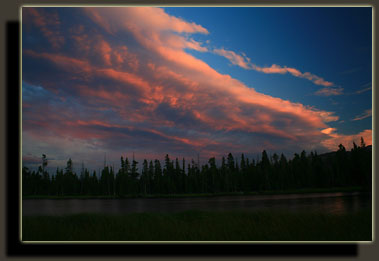 deciding
whether such perpetrators are mean-spirited jackasses or awesomely moronic,
because those are the only two options Iíve come up with. I cannot reconcile
the typical backpacker who goes out of his way to enjoy the beauty of nature
with the obviously crass disregard for such beauty by someone who wipes
and leaves it. If you didnít bring a bag with you, bury it. If you didnít
bring a shovel with you, use a rock to dig. If you leave it out in the
open then youíre fair game for whatever hideously foul things (and Iím
thinking feces related) Karma may bestow on you. There are lots of rules
that go along with wilderness travel, and Iím willing to bend on just about
any of them a little bit, but not this one. Take care of your crap in the
woods. deciding
whether such perpetrators are mean-spirited jackasses or awesomely moronic,
because those are the only two options Iíve come up with. I cannot reconcile
the typical backpacker who goes out of his way to enjoy the beauty of nature
with the obviously crass disregard for such beauty by someone who wipes
and leaves it. If you didnít bring a bag with you, bury it. If you didnít
bring a shovel with you, use a rock to dig. If you leave it out in the
open then youíre fair game for whatever hideously foul things (and Iím
thinking feces related) Karma may bestow on you. There are lots of rules
that go along with wilderness travel, and Iím willing to bend on just about
any of them a little bit, but not this one. Take care of your crap in the
woods.
After a multitide of
violent thoughts shimmered through my head, I decided that I had to move.
I packed my things back up and shouldered my pack. Since it had been about
30 minutes since Iíd eaten, my energy level was back up, and I decided
to just go on down the trail. This I did at around 6:00.
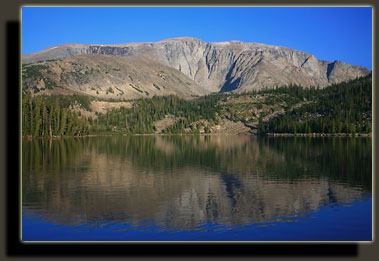 The
sun came out shortly after I rejoined the main loop, casting molten golden
slants of amber sunlight through the pines. A deep blue sky cleared overhead.
A bull moose stood munching water reeds at Her Lake about 200 meters from
the trail. I saw it briefly, then tried to get a little closer by cutting
through the trees. I had the dogs stay by the trail, but when I got to
the waterís edge, the moose had gone. We arrived at Old Crow Lake around
7:00, and three moose were eating in the shallow water of the lake. One
of them, a large cow, was only 20 feet from shore. I tried to quietly sneak
towards her through the trees with my camera drawn, but just as if in a
movie, my boot snapped a twig and sent the moose churning through the water
to the other side. I felt unhappy for having disturbed it, and decided
to keep my distance if I should see one again. The
sun came out shortly after I rejoined the main loop, casting molten golden
slants of amber sunlight through the pines. A deep blue sky cleared overhead.
A bull moose stood munching water reeds at Her Lake about 200 meters from
the trail. I saw it briefly, then tried to get a little closer by cutting
through the trees. I had the dogs stay by the trail, but when I got to
the waterís edge, the moose had gone. We arrived at Old Crow Lake around
7:00, and three moose were eating in the shallow water of the lake. One
of them, a large cow, was only 20 feet from shore. I tried to quietly sneak
towards her through the trees with my camera drawn, but just as if in a
movie, my boot snapped a twig and sent the moose churning through the water
to the other side. I felt unhappy for having disturbed it, and decided
to keep my distance if I should see one again.
I scouted out the north
side of the lake and found numerous flat areas covered by a canopy of large
pines and spruces. I will not belabor the frustration I experienced at
once again being confronted with multiple piles of white toilet paper scattered
about the area, either in the open or peering out from a small branch or
rock. I situated myself as far away as I could from the offending piles
and scouted around to make sure I was "in the clear" before unpacking my
stuff. My first order of 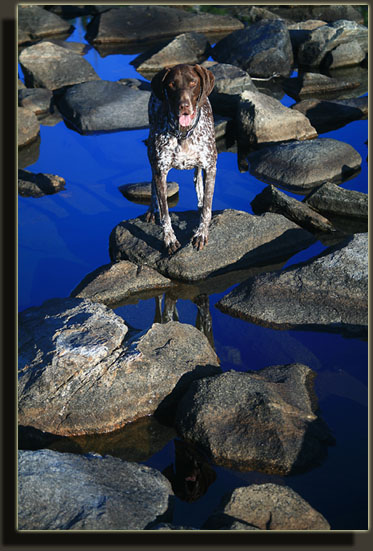 business
was to go to the water and filter some for drinking. The dogs and I walked
along a well-worn trail to the inlet where I sat on a broad flat rock and
filtered. The lake was buffered from the trees on three sides by tall sedges
growing in just an inch of water. The south bank was stony and trees
grew right up the edge. In the evening light, the water rippled with rising
trout. The area appeared to be completely without other humans. Back at
camp, I pitched the tent and threw my gear inside. After I brushed my teeth,
I hung my food between two large pines and then returned to the water with
my camera to photograph the pink clouds gathering overhead. To my surprise,
a moose was back in the water some distance away, casually plunging her
head into the water for 20-30 seconds at a time then rising up chewing
long leafy matter. I crouched low near the grass at the edge of the pines
and watched her for 20 minutes or so, thankful that there were very few
mosquitoes about. After the clouds faded to dark blue, I returned to the
tent and went straight to sleep. business
was to go to the water and filter some for drinking. The dogs and I walked
along a well-worn trail to the inlet where I sat on a broad flat rock and
filtered. The lake was buffered from the trees on three sides by tall sedges
growing in just an inch of water. The south bank was stony and trees
grew right up the edge. In the evening light, the water rippled with rising
trout. The area appeared to be completely without other humans. Back at
camp, I pitched the tent and threw my gear inside. After I brushed my teeth,
I hung my food between two large pines and then returned to the water with
my camera to photograph the pink clouds gathering overhead. To my surprise,
a moose was back in the water some distance away, casually plunging her
head into the water for 20-30 seconds at a time then rising up chewing
long leafy matter. I crouched low near the grass at the edge of the pines
and watched her for 20 minutes or so, thankful that there were very few
mosquitoes about. After the clouds faded to dark blue, I returned to the
tent and went straight to sleep.
My alarm went off the
following morning at 4:00. Pretty ambitious, and as it turned out, too
much to ask. My body simply said no, and I fell back asleep until around
5:45, when a faint gray light woke me up, or was it Makenzie standing over
me breathing horrible dog breath into my dreams? I dressed quickly and
grabbed some food from the hanging cache before heading out up the trail
I had seen before that presumably lead uphill towards treeline and a nice
shot of Bighorn Peak. I followed the trail as it wound through the lodgepole
forest, but with difficulty, and before long I lost it completely and set
off straight west. This plunged us into a rockfield that took a long time
to cross. By the time we got to a spot where I could even see Bighorn Peak,
sunrise had come and gone, replaced by the flat white light of morning.
I picked a likely direction and came out at Lame Deer Lake with little
trouble. This lake, also, was devoid of people at the moment. I noted with
some 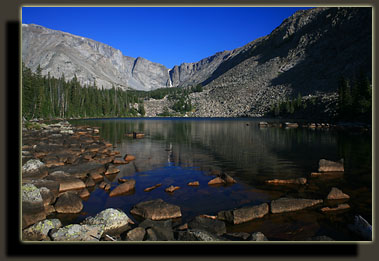 surprise
a well-established path on the edge of the woods. A beaten flat with a
fire ring confirmed that people had camped here. Horseshoe prints dotted
the dry loose soil, and in what was appearing to be a trend, piles of paper-crowned
shit dotted the woods further back. I wondered if it was a regional thing,
not packing out toilet paper. The lake itself was beautiful, and the view
of Bighorn and Dalton Peaks was fantastic. I was lucky to have a nice clear
morning. The dogs and I walked through the trees, following the faint trail,
to the outflow, which was another large rockfield with water gurgling somewhere
far beneath. Frank was out ahead, but Makenzie ran past him in her zeal
to be first and knocked him off the rock and down in between two massive
boulders and out of sight. I heard scratching claws on rock as he went
down. In four quick steps I was over him, and luckily he was only down
about 3 feet. I slid one leg down between the rocks and then leaned down
and pulled him up. I firmly told Makenzie not to do that again. She wagged
her tail, and obviously had no idea what I was saying. In retrospect, I
have no idea why I said anything at all. I guess part of me suspects that
dogs secretly understand human speech very well and are just playing dumb
about it beacause itís to their advantage. Perhaps because of that faint
possibility, I often find myself giving cogent, surprise
a well-established path on the edge of the woods. A beaten flat with a
fire ring confirmed that people had camped here. Horseshoe prints dotted
the dry loose soil, and in what was appearing to be a trend, piles of paper-crowned
shit dotted the woods further back. I wondered if it was a regional thing,
not packing out toilet paper. The lake itself was beautiful, and the view
of Bighorn and Dalton Peaks was fantastic. I was lucky to have a nice clear
morning. The dogs and I walked through the trees, following the faint trail,
to the outflow, which was another large rockfield with water gurgling somewhere
far beneath. Frank was out ahead, but Makenzie ran past him in her zeal
to be first and knocked him off the rock and down in between two massive
boulders and out of sight. I heard scratching claws on rock as he went
down. In four quick steps I was over him, and luckily he was only down
about 3 feet. I slid one leg down between the rocks and then leaned down
and pulled him up. I firmly told Makenzie not to do that again. She wagged
her tail, and obviously had no idea what I was saying. In retrospect, I
have no idea why I said anything at all. I guess part of me suspects that
dogs secretly understand human speech very well and are just playing dumb
about it beacause itís to their advantage. Perhaps because of that faint
possibility, I often find myself giving cogent, 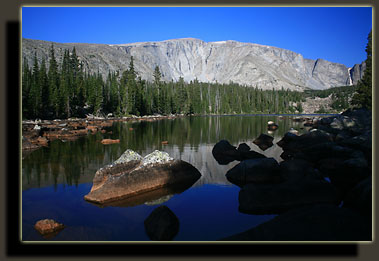 logical
explanations or detailed instructions to my wagging companions. This may
indicate that serious delusional behavior is in my future. We reached the
far side of the outflow rock field and entered into the trees on
faint path that we quickly lost. No matter, hiking through the trees was
infinitely preferable to hiking through the rockfield, so I simply walked
west, ducking under low branches and trying to keep track of the dogs in
the thick woods. I believe they keep better track of me than I of them.
On the west side of the lake, I took a brief turn at fishing, but grew
bored in almost no time as I itched to explore the lakes further up and
didnít give it my full effort. We crossed a couple of inlets to the lake,
then struck out uphill through the trees and into an area with massive
amounts of downed timber. Very few trees remained standing, and it seems
that there was a fire here a long time ago. The travel was exceedingly
slow as there was no apparent trail, and any direction one cared to walk
was barred by a thousand large logs. I headed directly for the next patch
of living trees, hoping to recapture the easy walking, and we did. I took
a break by a logical
explanations or detailed instructions to my wagging companions. This may
indicate that serious delusional behavior is in my future. We reached the
far side of the outflow rock field and entered into the trees on
faint path that we quickly lost. No matter, hiking through the trees was
infinitely preferable to hiking through the rockfield, so I simply walked
west, ducking under low branches and trying to keep track of the dogs in
the thick woods. I believe they keep better track of me than I of them.
On the west side of the lake, I took a brief turn at fishing, but grew
bored in almost no time as I itched to explore the lakes further up and
didnít give it my full effort. We crossed a couple of inlets to the lake,
then struck out uphill through the trees and into an area with massive
amounts of downed timber. Very few trees remained standing, and it seems
that there was a fire here a long time ago. The travel was exceedingly
slow as there was no apparent trail, and any direction one cared to walk
was barred by a thousand large logs. I headed directly for the next patch
of living trees, hoping to recapture the easy walking, and we did. I took
a break by a 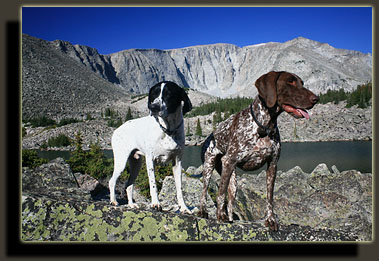 nameless
lake in the Chill Lakes complex, and photographed the splendor of the walls
below Bighorn Peak. We were now within the canyon formed by the glacier,
and on both sides the walls were steep, rugged and tall. Glacier cirques
sure are dramatic, if not a pain to travel in. I had a Clif bar and drank
a lot of water, aware that I had not had a drop since we left camp almost
2 hours before. In the shade and the pleasant grass by the lake, Frank
curled up and napped. Makenzie entreated me to throw a rock for her to
chase, which I did a few times. I donít quite understand why Makenzie prefers
rocks to sticks. A stick seems to be easier to carry, to hold a scent better,
and easier to find. Iíve tried to make the switch a few times by getting
her interested in stick when she presents me with a rock, then throwing
the stick into the woods. Sheís interested in the stick, all right, and
goes to get it, just as soon as she grabs her rock in her mouth. She used
to accidentally swallow small rocks with alarming frequency, then vomit
them up along with a wad of grass. This went on for some time without any
apparent recognition of cause and effect on her part. She must have caught
on at some point though because that hasnít happened in over a year now. nameless
lake in the Chill Lakes complex, and photographed the splendor of the walls
below Bighorn Peak. We were now within the canyon formed by the glacier,
and on both sides the walls were steep, rugged and tall. Glacier cirques
sure are dramatic, if not a pain to travel in. I had a Clif bar and drank
a lot of water, aware that I had not had a drop since we left camp almost
2 hours before. In the shade and the pleasant grass by the lake, Frank
curled up and napped. Makenzie entreated me to throw a rock for her to
chase, which I did a few times. I donít quite understand why Makenzie prefers
rocks to sticks. A stick seems to be easier to carry, to hold a scent better,
and easier to find. Iíve tried to make the switch a few times by getting
her interested in stick when she presents me with a rock, then throwing
the stick into the woods. Sheís interested in the stick, all right, and
goes to get it, just as soon as she grabs her rock in her mouth. She used
to accidentally swallow small rocks with alarming frequency, then vomit
them up along with a wad of grass. This went on for some time without any
apparent recognition of cause and effect on her part. She must have caught
on at some point though because that hasnít happened in over a year now.
We moved on from this
lake through the trees to the next lake up the canyon, a wide lake that
barred easy passage up the canyon. From the eastern shore, I could see
that further travel would be very tough because from there on, everything
was rockfield. Perhaps foolishly, I decided to try to reach the unnamed
lake at the base of Bighorn Peak. To get there, we retreated back into
the woods and went west around the south side of the lake. Then it just
got silly hard. The next mile took over an hour as we picked our way across
a frozen avalanche of giant boulders. It was hard enough for me with my 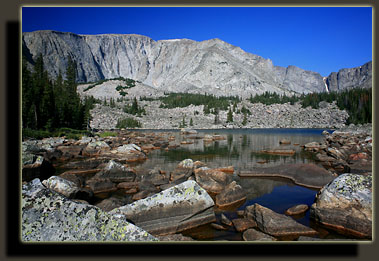 stiff-soled
boots and long legs. The dogs had a very rough time of it. Sometimes we
had to backtrack 20 feet or more to find a way across. More than once I
had to ferry both dogs across a crevice that I could cross with ease, but
they could not. With boots on it is very easy to use a quarter sized point
of rock as a footstep, but dogs canít do that. Before long I was picking
our route with them in mind, searching for broad, flat boulders that lay
close together. For once, both dogs stayed behind me. Uphill we went to
a point above the small lake where we then had to cross a field of Krumholtz
fir to get close enough to look down in its depression to see it. There
it was, the most barren lake Iíve ever seen. Nothing but rock, water and
sky. It was intimidating, and although I reveled in the austere beauty
of it, I nevertheless desired to get away from this rock hell and back
into the trees. We turned around, and I regretted coming up this far when
I looked back over the acres of rocks we now had to cross to get back down.
I tried not to think of it, and picked a route as best I could for the
dogs. We did stop at a patch of trees about 15 feet tall and have a break.
Frank curled up and napped. Makenzie brought me fetching rocks but I ignored
her while I snacked and made some notes. The sun was still shining brightly,
and the sky was brilliant blue. Below, the valley carved by the glacier
was a wasteland of rock pocked with stands of short fir. Slowly, we moved
on down, and of course eventually we made it back to the lake and the large
trees anchored in smooth solid soil. From there the going was quick back
down to Lame Deer Lake where we had another break and relaxed in the shade.
A stiff breeze rippled the lake water, and I threw out thoughts of fly
fishing in such a stiff wind. Determined to avoid rockfields at all costs,
I tried to follow the trail that led from the lake to the east, hoping
it would lead to Old Crow Lake. Examining the map, I could not believe
it would lead anywhere else. My ability to follow the cairns of this trail
lasted all of 100 meters before I was left scratching me head and looking
around. Finally, I simply set off in a likely direction and hoped for the
best. The best turned out to be another miserable rockfield, only with
this saving grace: raspberries by the millions. We made very slow progress
as I gorged on the delicious fruit, tossing some to the dogs now stiff-soled
boots and long legs. The dogs had a very rough time of it. Sometimes we
had to backtrack 20 feet or more to find a way across. More than once I
had to ferry both dogs across a crevice that I could cross with ease, but
they could not. With boots on it is very easy to use a quarter sized point
of rock as a footstep, but dogs canít do that. Before long I was picking
our route with them in mind, searching for broad, flat boulders that lay
close together. For once, both dogs stayed behind me. Uphill we went to
a point above the small lake where we then had to cross a field of Krumholtz
fir to get close enough to look down in its depression to see it. There
it was, the most barren lake Iíve ever seen. Nothing but rock, water and
sky. It was intimidating, and although I reveled in the austere beauty
of it, I nevertheless desired to get away from this rock hell and back
into the trees. We turned around, and I regretted coming up this far when
I looked back over the acres of rocks we now had to cross to get back down.
I tried not to think of it, and picked a route as best I could for the
dogs. We did stop at a patch of trees about 15 feet tall and have a break.
Frank curled up and napped. Makenzie brought me fetching rocks but I ignored
her while I snacked and made some notes. The sun was still shining brightly,
and the sky was brilliant blue. Below, the valley carved by the glacier
was a wasteland of rock pocked with stands of short fir. Slowly, we moved
on down, and of course eventually we made it back to the lake and the large
trees anchored in smooth solid soil. From there the going was quick back
down to Lame Deer Lake where we had another break and relaxed in the shade.
A stiff breeze rippled the lake water, and I threw out thoughts of fly
fishing in such a stiff wind. Determined to avoid rockfields at all costs,
I tried to follow the trail that led from the lake to the east, hoping
it would lead to Old Crow Lake. Examining the map, I could not believe
it would lead anywhere else. My ability to follow the cairns of this trail
lasted all of 100 meters before I was left scratching me head and looking
around. Finally, I simply set off in a likely direction and hoped for the
best. The best turned out to be another miserable rockfield, only with
this saving grace: raspberries by the millions. We made very slow progress
as I gorged on the delicious fruit, tossing some to the dogs now 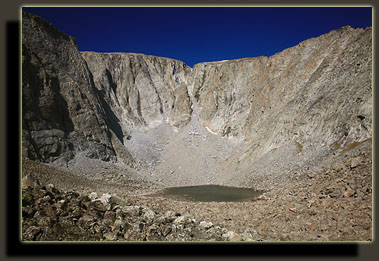 and
again. Frank especially kept interest. To Makenzie, I believe they were
less desirable than tossed rocks. As luck would have it, I found a cairn
in my aimless grazing, and then spotted another. I followed them over a
route that in no way could be called a trail and made pretty quick progress.
Often, I had to look hard to see them, but the cairns were fairly regular
across the rockfield (and obviously well-camouflaged). The rockfield gave
way to another burned area with lots of downed trees, and then back into
the woods. I began to suspect I was close to Old Crow Lake. I lost the
"trail" several times, but seemed to regain it after 30-50 feet, and thus
made it back to camp by around 1:00. and
again. Frank especially kept interest. To Makenzie, I believe they were
less desirable than tossed rocks. As luck would have it, I found a cairn
in my aimless grazing, and then spotted another. I followed them over a
route that in no way could be called a trail and made pretty quick progress.
Often, I had to look hard to see them, but the cairns were fairly regular
across the rockfield (and obviously well-camouflaged). The rockfield gave
way to another burned area with lots of downed trees, and then back into
the woods. I began to suspect I was close to Old Crow Lake. I lost the
"trail" several times, but seemed to regain it after 30-50 feet, and thus
made it back to camp by around 1:00.
I lunched on granola
with powdered milk, then fell into my tent and snoozed. Unfortunately the
timing was poor, since at around 2:00 the sun hit the tent and began to
cook us all inside. I opened all the doors, not caring if flies and mosquitoes
entered in, and tore off my shirt and socks but it was still too hot. I
dressed again and got out of the tent. I decided to go for a short walk
up the trail to get a better idea of where it lead. Thus I spent the next
two hours walking up and down the route, doubling back and looking for
cairns, placing cairns where I felt they were desperately needed, then
finding there were always potential wrong turns to make. In the end, I
picked a great spot to photograph sunrise on Bighorn Peak, and memorized
carefully all the turns I had to take in the 15-minute walk back to camp.
I puttered around at
camp, made Ramen noodles with tuna, filtered water, examined the map. I
had not drank near enough water over the course of the day, and my head
throbbed mightily, limiting my actions to small, low-exertion options.
Generally, I was pretty bored. Clouds built up and a gray light descended
on the woods, giving them an uninviting and foreboding feel. Down at the
water, moose were at it again, eating the leaves and seeming not to mind
we were around. Often while at camp I would here them walk past behind
a screen of trees not more than 20 yards away. When I filtered water I
was in plain sight to them, but they seemed to pay me no attention. When
I stood at the inlet and fly-fished, I did not stare too directly at the
moose watching me quietly from the willows only 30 feet away. She never
moved, and after I fished for 20 minutes without catching anything, I walked
back to camp and watched her out of the corner of my eye as I left. I enjoyed
having them around. There are few animals in North America more pleasant
to watch than moose. Plus I figured the moose wouldnít hang around long
if a bear came lumbering by. Or maybe they might. After all I canít see
a black bear taking on a full-grown moose.
I was very tired, and
got into the sack at around 7:00. I finished reading The Stranger, and
determined it was not a very enjoyable book. I was dimly aware that the
author was trying to convey some profound concept, but in my near-sunstroked
state, I just wasnít getting it. I finally fell asleep sometime around
9:00, but slept fitfully as my salt-covered body seemed to stick to everything.
Either I was hot and sweaty under the sleeping bag, or chilled when I was
out of it. Makenzie spent half the night standing in the tent watching
me, as if I would jump up at any minute and say, "Címon Makenzie, itís
1AM so letís 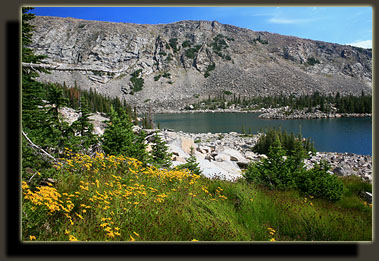 go
for a walk in the pitch-black forest!" I had bad dreams. Generally, it
was a very crappy night. At 5AM when my alarm went off, I was relieved
that the sun would come soon and I could get out of the tent. Some people
find it distasteful, or even a sacrilege, to wear a watch while backpacking,
as if it is bringing too much modern technology into what should be largely
a primitive and removed experience. Some of these very same people carry
GPS units, but I wonít delve into that irony there. The watch alarm is
the only way I can ever get up in time to witness the most beautiful 10
minutes of the day, so I keep one with me on every trip. Besides, it always
seems to me that the folks who donít wear watches in the woods are always
asking me what time it is. So why not just wear one? I dressed quickly
and the dogs were aquiver with anticipation. I unzipped the tent and they,
as Frank had by this time caught on that there was action to be had, spilled
out of the tent like wriggling worms and scattered into the woods to pee,
crap, sniff, scratch their crotch and do all those things dogs like to
do in the morning. In the grey twilight of pre-dawn I laced my boots and
slipped on my sweatshirt. I examined the sky and could not ascertain if
there were clouds or not. It was dark enough that I should have been able
to see stars, but at 5AM it should not be that dark. I walked down the
water to see more of the sky, and then I saw on the eastern horizon a slip
of yellow sky that offset all the rest and confirmed that all I was looking
at was an unbroken conglomerate of low, wet clouds. Having no desire to
hike over the dubious route to the sunrise location I had staked out the
night before only to watch it under cloud cover, I walked back to the tent
and laid down on my sleeping bag for a nap. Surprisingly, I slept better
fully clothed than I had all night, perhaps because I didnít sweat as much
not being under the sleeping bag. I awoke again at quarter to 8, refreshed.
The sky did not seem to have changed at all. I determined then and there
to hike back to the car and drive to another location in the Bighorns where
I could do some additional exploring. I quickly ate granola and powdered
milk for breakfast, then packed camp and set off down the trail by 8:30. go
for a walk in the pitch-black forest!" I had bad dreams. Generally, it
was a very crappy night. At 5AM when my alarm went off, I was relieved
that the sun would come soon and I could get out of the tent. Some people
find it distasteful, or even a sacrilege, to wear a watch while backpacking,
as if it is bringing too much modern technology into what should be largely
a primitive and removed experience. Some of these very same people carry
GPS units, but I wonít delve into that irony there. The watch alarm is
the only way I can ever get up in time to witness the most beautiful 10
minutes of the day, so I keep one with me on every trip. Besides, it always
seems to me that the folks who donít wear watches in the woods are always
asking me what time it is. So why not just wear one? I dressed quickly
and the dogs were aquiver with anticipation. I unzipped the tent and they,
as Frank had by this time caught on that there was action to be had, spilled
out of the tent like wriggling worms and scattered into the woods to pee,
crap, sniff, scratch their crotch and do all those things dogs like to
do in the morning. In the grey twilight of pre-dawn I laced my boots and
slipped on my sweatshirt. I examined the sky and could not ascertain if
there were clouds or not. It was dark enough that I should have been able
to see stars, but at 5AM it should not be that dark. I walked down the
water to see more of the sky, and then I saw on the eastern horizon a slip
of yellow sky that offset all the rest and confirmed that all I was looking
at was an unbroken conglomerate of low, wet clouds. Having no desire to
hike over the dubious route to the sunrise location I had staked out the
night before only to watch it under cloud cover, I walked back to the tent
and laid down on my sleeping bag for a nap. Surprisingly, I slept better
fully clothed than I had all night, perhaps because I didnít sweat as much
not being under the sleeping bag. I awoke again at quarter to 8, refreshed.
The sky did not seem to have changed at all. I determined then and there
to hike back to the car and drive to another location in the Bighorns where
I could do some additional exploring. I quickly ate granola and powdered
milk for breakfast, then packed camp and set off down the trail by 8:30.
I came upon 2 young
hikers in bright red slickers on the trail. One of them asked why Makenzie
had to carry all the weight and I said it was because she was the strong
one. Itís true. The day before, as a quick experiment, I put the pack on
Frank to see what heíd do. He didnít move at all. He wouldnít walk with
it. He just stood there, looking pathetic. So, thatís his effective strategy
for getting out of wearing sidepacks. Further along the trail I came to
the branch off to Willow Lake. I debated going to see Willow Lake for a
few seconds, but continued on the main route that ran rapidly downhill.
Within an hour of leaving Old Crow Lake, I was at Shard Lake. I took a
break and drank some water, adjusted my socks and ate half a Snickers bar.
Four men fished from the rocks on the far bank quietly under the ashen
sky. I dislike fishing under cloudy skies because you can almost never
see into the water, even with polarizer sunglasses. I much prefer to watch
the fish as 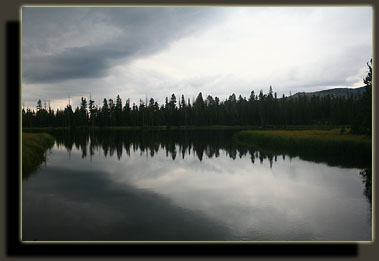 they
inspect my fly so I can know how much of a dud they recognize it for. Plus,
some days itís nice to at least confirm that there fish in the water when
it seems like there arenít any. Back on the trail, I headed downhill while
a nice old man was coming uphill. He commented about Makenzieís packs and
I told him she was a big help. He commented on how pretty she was. If she
can understand human speech, sheís got to be getting a pretty big head
by now from all these compliments. The last group of folks I saw consisted
of 4 backpackers adjusting their gear on the side of the trail, I passed
them by with a few greetings and then made my way uneventfully to my parked
car. On the way I passed the trailhead sign that said something like, "The
Forest Service is maintaining the wildness of this area by constructing
very few trails, bridges, etc." Well, thank you Forest Service! I am so
indebted to you forÖdoingÖnothingÖ(??) This is the double negative approach
to getting things done: Weíve succeeded in our goal to do nothing. Things
havenít changed since we took over and we feel thatís money well-spent.
I want that job where lack of tangible results means success. "Címon guys,
didnít the Forest Service do a bang-up job when they did nothing at all
last year? Thatís one government agency that does what it says! Results,
baby!" I actually enjoyed the lack of Ďtrails, bridges, etc.í but
I find it hilarious that the Forest Service touts this as an accomplishment.
They didnít do anything! How can you take credit for doing nothing? Itís
like accepting congratulations because it rained today. This is classic
Bush-Administration spin on land management activity: take no action at
all, but make it sound good. Hilarious. they
inspect my fly so I can know how much of a dud they recognize it for. Plus,
some days itís nice to at least confirm that there fish in the water when
it seems like there arenít any. Back on the trail, I headed downhill while
a nice old man was coming uphill. He commented about Makenzieís packs and
I told him she was a big help. He commented on how pretty she was. If she
can understand human speech, sheís got to be getting a pretty big head
by now from all these compliments. The last group of folks I saw consisted
of 4 backpackers adjusting their gear on the side of the trail, I passed
them by with a few greetings and then made my way uneventfully to my parked
car. On the way I passed the trailhead sign that said something like, "The
Forest Service is maintaining the wildness of this area by constructing
very few trails, bridges, etc." Well, thank you Forest Service! I am so
indebted to you forÖdoingÖnothingÖ(??) This is the double negative approach
to getting things done: Weíve succeeded in our goal to do nothing. Things
havenít changed since we took over and we feel thatís money well-spent.
I want that job where lack of tangible results means success. "Címon guys,
didnít the Forest Service do a bang-up job when they did nothing at all
last year? Thatís one government agency that does what it says! Results,
baby!" I actually enjoyed the lack of Ďtrails, bridges, etc.í but
I find it hilarious that the Forest Service touts this as an accomplishment.
They didnít do anything! How can you take credit for doing nothing? Itís
like accepting congratulations because it rained today. This is classic
Bush-Administration spin on land management activity: take no action at
all, but make it sound good. Hilarious.
I left the parking lot
with just 3 cars in it around 10:40. It began raining at that point, and
for once I had made it to the car in time. The rain and unending gray skies
made my decision for me: I simply pointed the car south and drove back
home.
Images from this
location and many others are available for sale at
 Page Created
11-5-06
Page Created
11-5-06
Comments |


 July
30-August 1, 2006
July
30-August 1, 2006
